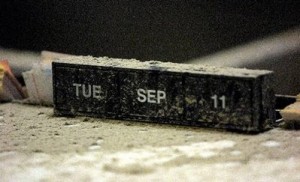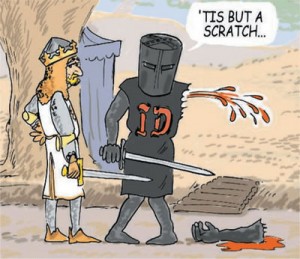Six months ago I started a novel, and in that time I’ve written enough words for most books–somewhere in the realm of 185k though 23k now lives in a deleted scenes file–but I’m only just beginning to know my characters. I mean really know them. This might be due in part to my penchant to discovery-write the majority of my story rather than meticulously plan every scene out in advance. I’m a Gardener, not an Architect, and that means I’ll be prone to much more rewriting.
Oh, I know the ending and several key events, who dies, who lives, and a few other elements of the story, but for me, I enjoy the process of discovering the nuances of my characters as I write. As a result, I’ve recently decided to start over. That is to say, I’ve decided to begin my second draft before finishing the first.
It’s not unheard of; David Farland–bestselling author of the Runelords series–has said he writes through the first half of a book then does a rewrite before tackling the second half. Granted, he’s a self-proclaimed Architect, but the practice seems sound in my opinion, especially since I’m doing it for the sake of character. I finally know much more about the motivations of my characters, their voices, how they would actually handle certain situations–which, in some cases, is different from what I wrote originally.
Many authors talk about how it takes them a few thousand words to truly get into the head of their characters–longer for those like myself writing Epic Fantasy since we’re often dealing with multiple POV characters and, depending on needs of the story,significantly larger casts. But it’s extremely important to know your characters. A good plot is important, key scenes that might be depicted in cover art are important, but, when you think about it, what you remember most about every book you’ve ever read or every movie you’ve ever seen are the characters. You remember the Vaders, the Gollums, the Tyrions, the Moiraines.
Every character should be the hero in their own story. Their motivations should make sense even if we as impartial–or even biased–readers disagree with them on a moral level. This is especially true of antagonists who can become flat and one dimensional if they are not at least some variant of gray. My primary antagonist just happens to be one of my favorite POV characters. He also happens to have the most complex motives, and is the main impetus for my decision to rewrite what I’ve already written before pushing on to the end. In many ways, he’s more a protagonist than antagonist in the true sense of the word, though he does work against the main protagonists’ goals.
So how does one accomplish the task of creating memorable characters? It starts with knowing them yourself, as their creator, the writer who gives flesh and blood to the ink of their existence. Learn their habits, their quirks, their wants and desires. This, I’ve come to discover, can only be achieved by writing in their heads for long enough to begin thinking as they think, acting as they act, loving or hating as they do. You must know them as well as you know yourself for ultimately, they are a part of you.
Another way to breathe life into a character is through physical description. I love to people watch, everywhere I go, looking for the tiny idiosyncrasies that make us all unique and which I might be able to apply to my own characters. It might be something simple: a limp, an incessant cough, the way a woman tilts her head when confused or a man clenches his fists when challenged. It could be something more subtle like speech patterns, grammar–or lack thereof–the amount of eye contact one person chooses to give versus another. We are all of us different, and so too should your characters be different from one another.
Perhaps the most important thing is to like your characters, even the antagonists. Robert Jordan used to say his favorite character was whichever one he was writing at any particular moment, something I took to heart. After all, if you don’t care about your characters–even the baddies–no one else will either. Give them something to strive for, something to long for, something that, if they don’t get it, will bring their world crashing down around them.
These are the things I’ve only now, after 180k+ words, discovered about some of my characters, and why I’ve decided to begin draft two of my novel. I was always going to do another draft anyway–perhaps many more since I’m more Gardener than Architect–so I do not feel like I’m going backwards by starting it now. I’ll be building stronger, more memorable characters, and that will go a long way toward getting this novel published. And who knows, maybe somewhere down the line, some other aspiring writer like me will mention Bos Illur in the same sentence as Vader, Gollum, Tyrion and Moiraine. One can only hope!
 This isn’t the blog post I set out to write. We aspire to be a blog for writers dealing with the business and/or process of writing. Sometimes though, writing is about more than the characters and the plot. Sometimes, it can be about real life, even when everyone in the story is wearing armor and carrying swords.
This isn’t the blog post I set out to write. We aspire to be a blog for writers dealing with the business and/or process of writing. Sometimes though, writing is about more than the characters and the plot. Sometimes, it can be about real life, even when everyone in the story is wearing armor and carrying swords.

